Chinese experts train local staff members on operation of Chinese-built railway
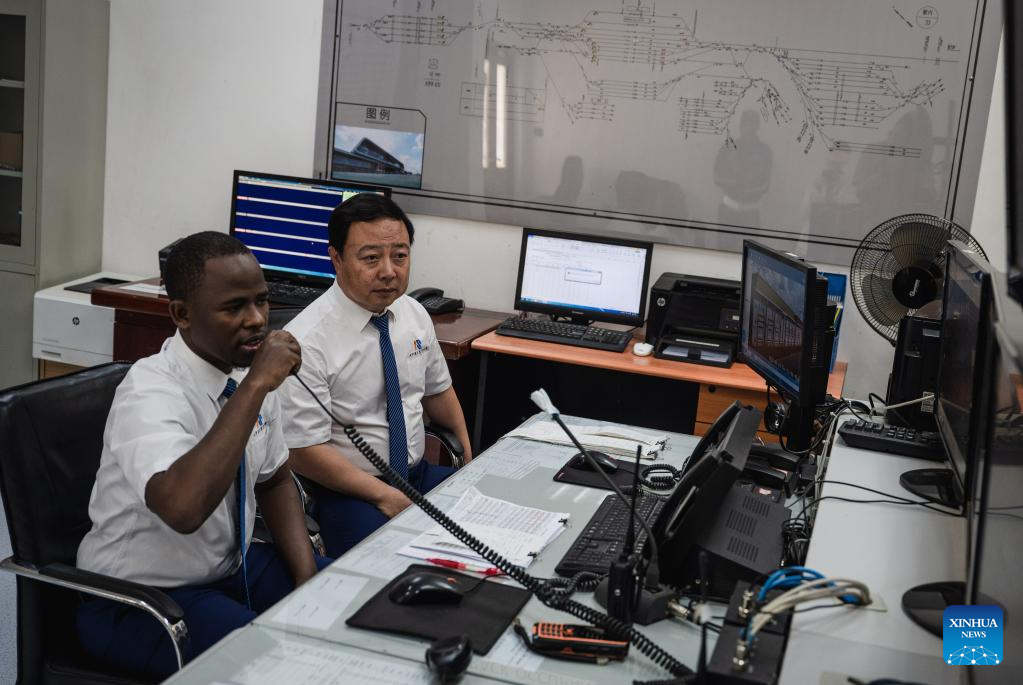
Chinese instructor Mao Xin (R) works with apprentice Peter Njenga at the Nairobi Station of the Mombasa-Nairobi Railway in Nairobi, Kenya, May 23, 2023. Mao works for the transportation department of Africa Star Railway Operation Company. He and his apprentice Peter Njenga have been working together on the dispatching plan to regulate train operation. "We have brought Chinese technical standards to Kenya without reservation, and most apprentices have reached the same operating standards." Mao said that helping Kenya build the first modern railway is a highlight of his career. Peter said that he had learned a lot of professional skills from his instructors, and he would pass on the knowledge to more people in the future.
The Mombasa-Nairobi Standard Gauge Railway in Kenya has become a flagship project of China-Africa cooperation, a "business card" of Chinese enterprises and a demonstration project of the Belt and Road Initiative.
The 480-km rail line, linking the largest port in East Africa, Mombasa, to Kenya's capital Nairobi, was built by the China Road and Bridge Corporation and officially opened to traffic in 2017.
The project has gained trust and support from the Kenyan government and people and injected vitality into the country's socio-economic development, since Africa Star Railway Operation Company (AfriStar), the railway operator, has always been committed to ensuring safe operation, boosting the movement of passengers and goods, and enhancing localization of the project.
Chinese experts have been saving no effort in training local staff members and transfer technologies and know-hows to their local counterparts since the railway project started from scratch.
After years of professional training and practice, many Kenyan employees have become skilled workers who can fulfill tasks on their own, and more and more sections of the railway have been independently operated by Kenyan locomotive drivers since February 2022. The mutual diligence also thickened heart-to-heart ties between the Chinese instructors and their Kenyan apprentices.
According to AfriStar, Chinese instructors are going to gradually conclude their missions here and return home, leaving on-premise jobs solely to their Kenyan apprentices, but their friendship would last forever and yield richer fruits in the future. (Xinhua/Wang Guansen)
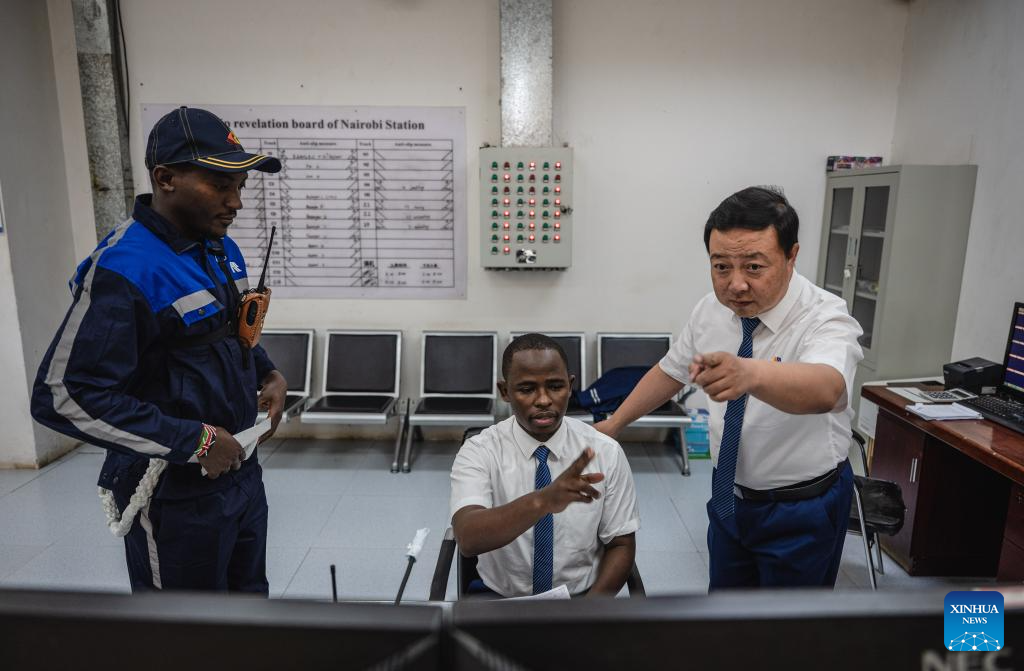
Chinese instructor Mao Xin (R) and apprentice Peter Njenga (C) work at the Nairobi Station of the Mombasa-Nairobi Railway in Nairobi, Kenya, May 23, 2023. Mao works for the transportation department of Africa Star Railway Operation Company. He and his apprentice Peter Njenga have been working together on the dispatching plan to regulate train operation. "We have brought Chinese technical standards to Kenya without reservation, and most apprentices have reached the same operating standards." Mao said that helping Kenya build the first modern railway is a highlight of his career. Peter said that he had learned a lot of professional skills from his instructors, and he would pass on the knowledge to more people in the future.
The Mombasa-Nairobi Standard Gauge Railway in Kenya has become a flagship project of China-Africa cooperation, a "business card" of Chinese enterprises and a demonstration project of the Belt and Road Initiative.
The 480-km rail line, linking the largest port in East Africa, Mombasa, to Kenya's capital Nairobi, was built by the China Road and Bridge Corporation and officially opened to traffic in 2017.
The project has gained trust and support from the Kenyan government and people and injected vitality into the country's socio-economic development, since Africa Star Railway Operation Company (AfriStar), the railway operator, has always been committed to ensuring safe operation, boosting the movement of passengers and goods, and enhancing localization of the project.
Chinese experts have been saving no effort in training local staff members and transfer technologies and know-hows to their local counterparts since the railway project started from scratch.
After years of professional training and practice, many Kenyan employees have become skilled workers who can fulfill tasks on their own, and more and more sections of the railway have been independently operated by Kenyan locomotive drivers since February 2022. The mutual diligence also thickened heart-to-heart ties between the Chinese instructors and their Kenyan apprentices.
According to AfriStar, Chinese instructors are going to gradually conclude their missions here and return home, leaving on-premise jobs solely to their Kenyan apprentices, but their friendship would last forever and yield richer fruits in the future. (Xinhua/Wang Guansen)
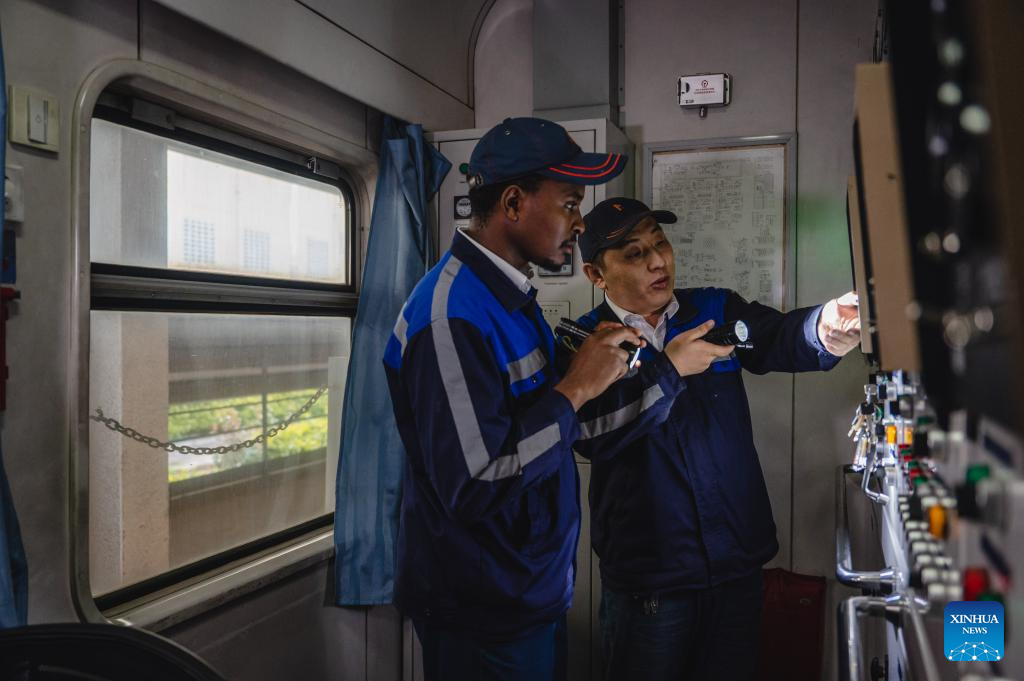
Chinese instructor Wu Tongming (R) and apprentice Boniface Kirumwa inspect a train on Mombasa-Nairobi Railway in Nairobi, Kenya, May 23, 2023. Wu is an engineer of Africa Star Railway Operation Company who has been working in Nairobi since 2017. With the increase of Mombasa-Nairobi Railway's demand for transport capacity, he worked with the apprentices to update the testing rules for the additional night trains. "I was impressed by the apprentices' initiative," Wu said. Boniface Kirumwa believes that learning from Chinese instructors helps him gain technical and practical experience. "I hope more Chinese instructors will come to Kenya in the future and work with us to promote infrastructure development," said Kirumwa.
The Mombasa-Nairobi Standard Gauge Railway in Kenya has become a flagship project of China-Africa cooperation, a "business card" of Chinese enterprises and a demonstration project of the Belt and Road Initiative.
The 480-km rail line, linking the largest port in East Africa, Mombasa, to Kenya's capital Nairobi, was built by the China Road and Bridge Corporation and officially opened to traffic in 2017.
The project has gained trust and support from the Kenyan government and people and injected vitality into the country's socio-economic development, since Africa Star Railway Operation Company (AfriStar), the railway operator, has always been committed to ensuring safe operation, boosting the movement of passengers and goods, and enhancing localization of the project.
Chinese experts have been saving no effort in training local staff members and transfer technologies and know-hows to their local counterparts since the railway project started from scratch.
After years of professional training and practice, many Kenyan employees have become skilled workers who can fulfill tasks on their own, and more and more sections of the railway have been independently operated by Kenyan locomotive drivers since February 2022. The mutual diligence also thickened heart-to-heart ties between the Chinese instructors and their Kenyan apprentices.
According to AfriStar, Chinese instructors are going to gradually conclude their missions here and return home, leaving on-premise jobs solely to their Kenyan apprentices, but their friendship would last forever and yield richer fruits in the future. (Xinhua/Wang Guansen)
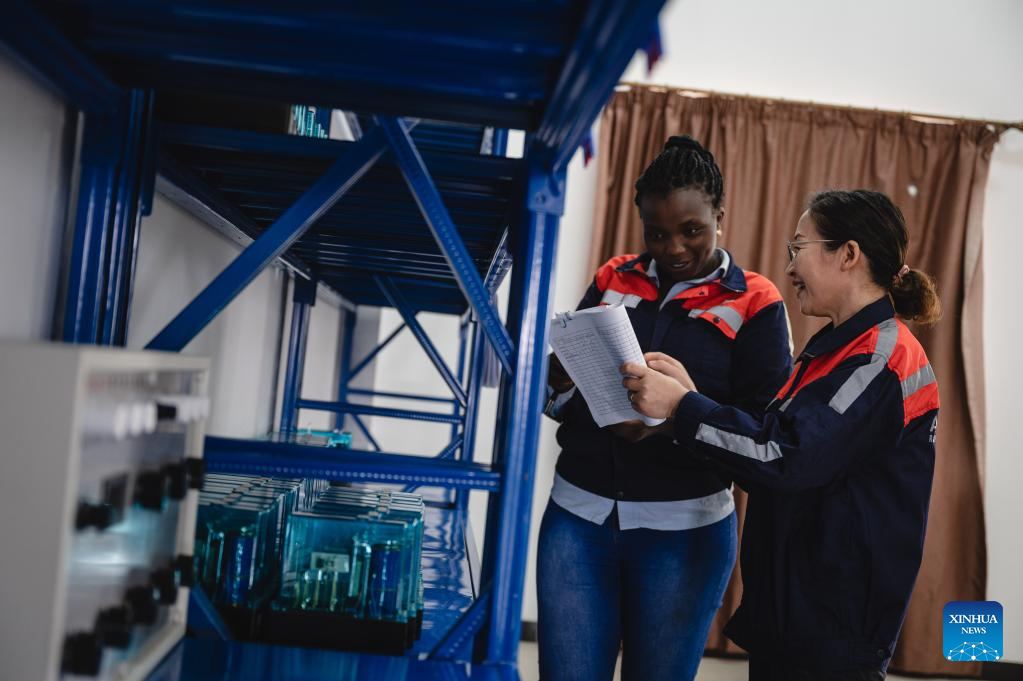
Chinese instructor Chen Ling (R) works with apprentice Lucy Njeri Wanjohi in Nairobi, Kenya, May 23, 2023. Chen works for the electrical equipment maintenance section of the Africa Star Railway Operation Company. In the four years she has been working in Kenya, she witnessed the improvement on vocational skills of her female apprentices. "Now they can all work on their own," Chen said. Judith Wanzila Peter, one of Chen's apprentices, said she learned more than just skills from her instructor. She also learned a lot from their intercultural exchanges. "We are more like friends and sisters," Judith said.
The Mombasa-Nairobi Standard Gauge Railway in Kenya has become a flagship project of China-Africa cooperation, a "business card" of Chinese enterprises and a demonstration project of the Belt and Road Initiative.
The 480-km rail line, linking the largest port in East Africa, Mombasa, to Kenya's capital Nairobi, was built by the China Road and Bridge Corporation and officially opened to traffic in 2017.
The project has gained trust and support from the Kenyan government and people and injected vitality into the country's socio-economic development, since Africa Star Railway Operation Company (AfriStar), the railway operator, has always been committed to ensuring safe operation, boosting the movement of passengers and goods, and enhancing localization of the project.
Chinese experts have been saving no effort in training local staff members and transfer technologies and know-hows to their local counterparts since the railway project started from scratch.
After years of professional training and practice, many Kenyan employees have become skilled workers who can fulfill tasks on their own, and more and more sections of the railway have been independently operated by Kenyan locomotive drivers since February 2022. The mutual diligence also thickened heart-to-heart ties between the Chinese instructors and their Kenyan apprentices.
According to AfriStar, Chinese instructors are going to gradually conclude their missions here and return home, leaving on-premise jobs solely to their Kenyan apprentices, but their friendship would last forever and yield richer fruits in the future. (Xinhua/Wang Guansen)
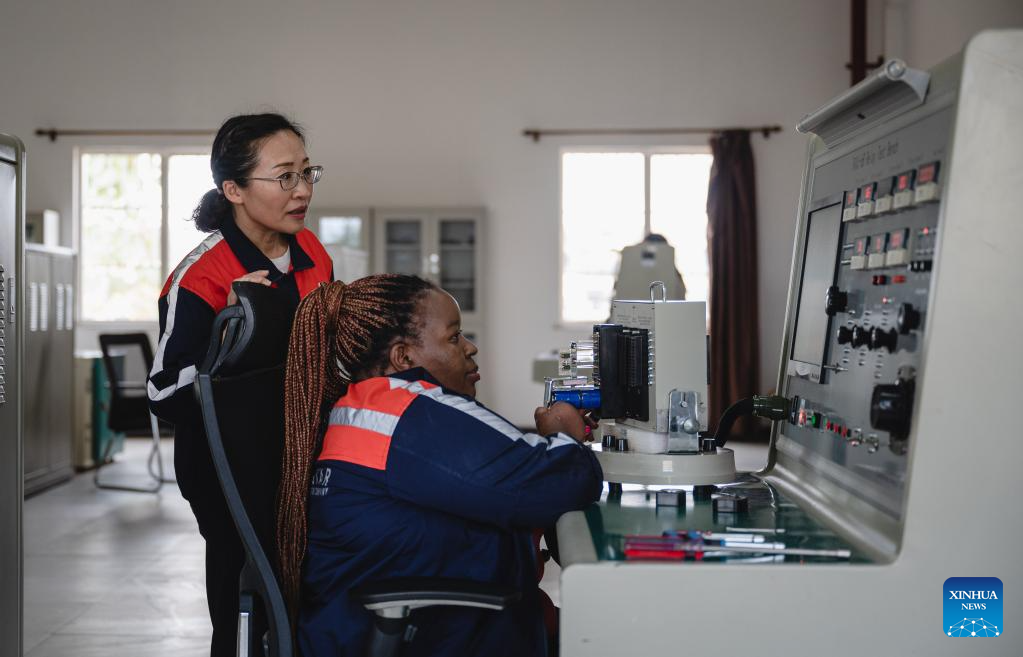
Chinese instructor Chen Ling (L) instructs apprentice Judith Wanzila Peter on operating electrical devices in Nairobi, Kenya, May 23, 2023. Chen works for the electrical equipment maintenance section of the Africa Star Railway Operation Company. In the four years she has been working in Kenya, she witnessed the improvement on vocational skills of her female apprentices. "Now they can all work on their own," Chen said. Judith, one of Chen's apprentices, said she learned more than just skills from her instructor. She also learned a lot from their intercultural exchanges. "We are more like friends and sisters," Judith said.
The Mombasa-Nairobi Standard Gauge Railway in Kenya has become a flagship project of China-Africa cooperation, a "business card" of Chinese enterprises and a demonstration project of the Belt and Road Initiative.
The 480-km rail line, linking the largest port in East Africa, Mombasa, to Kenya's capital Nairobi, was built by the China Road and Bridge Corporation and officially opened to traffic in 2017.
The project has gained trust and support from the Kenyan government and people and injected vitality into the country's socio-economic development, since Africa Star Railway Operation Company (AfriStar), the railway operator, has always been committed to ensuring safe operation, boosting the movement of passengers and goods, and enhancing localization of the project.
Chinese experts have been saving no effort in training local staff members and transfer technologies and know-hows to their local counterparts since the railway project started from scratch.
After years of professional training and practice, many Kenyan employees have become skilled workers who can fulfill tasks on their own, and more and more sections of the railway have been independently operated by Kenyan locomotive drivers since February 2022. The mutual diligence also thickened heart-to-heart ties between the Chinese instructors and their Kenyan apprentices.
According to AfriStar, Chinese instructors are going to gradually conclude their missions here and return home, leaving on-premise jobs solely to their Kenyan apprentices, but their friendship would last forever and yield richer fruits in the future. (Xinhua/Wang Guansen)
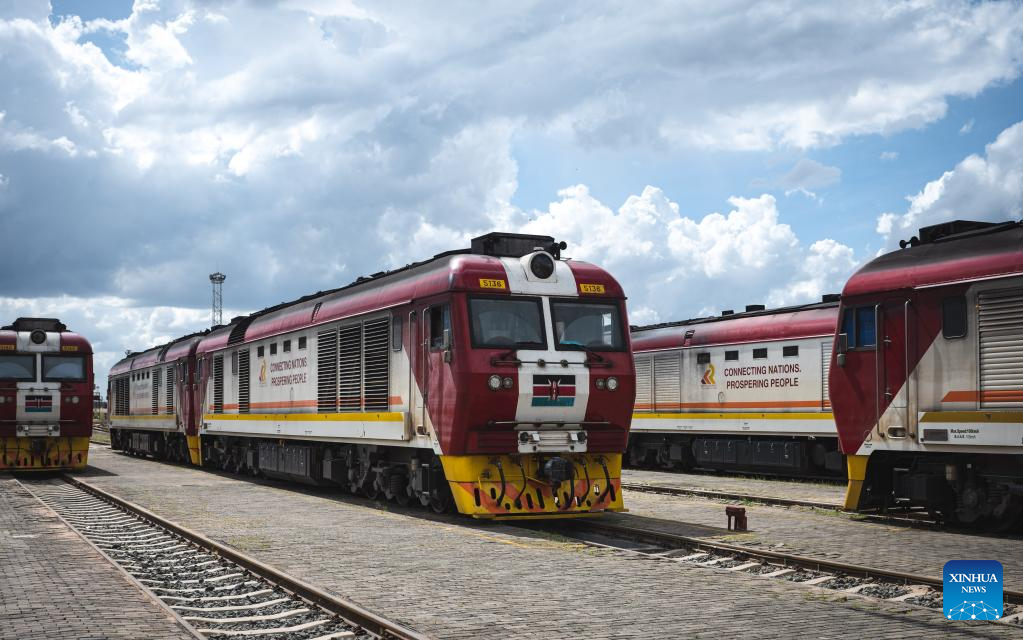
This photo taken on May 23, 2023 shows trains of the Mombasa-Nairobi Railway in Nairobi, Kenya.
The Mombasa-Nairobi Standard Gauge Railway in Kenya has become a flagship project of China-Africa cooperation, a "business card" of Chinese enterprises and a demonstration project of the Belt and Road Initiative.
The 480-km rail line, linking the largest port in East Africa, Mombasa, to Kenya's capital Nairobi, was built by the China Road and Bridge Corporation and officially opened to traffic in 2017.
The project has gained trust and support from the Kenyan government and people and injected vitality into the country's socio-economic development, since Africa Star Railway Operation Company (AfriStar), the railway operator, has always been committed to ensuring safe operation, boosting the movement of passengers and goods, and enhancing localization of the project.
Chinese experts have been saving no effort in training local staff members and transfer technologies and know-hows to their local counterparts since the railway project started from scratch.
After years of professional training and practice, many Kenyan employees have become skilled workers who can fulfill tasks on their own, and more and more sections of the railway have been independently operated by Kenyan locomotive drivers since February 2022. The mutual diligence also thickened heart-to-heart ties between the Chinese instructors and their Kenyan apprentices.
According to AfriStar, Chinese instructors are going to gradually conclude their missions here and return home, leaving on-premise jobs solely to their Kenyan apprentices, but their friendship would last forever and yield richer fruits in the future. (Xinhua/Wang Guansen)
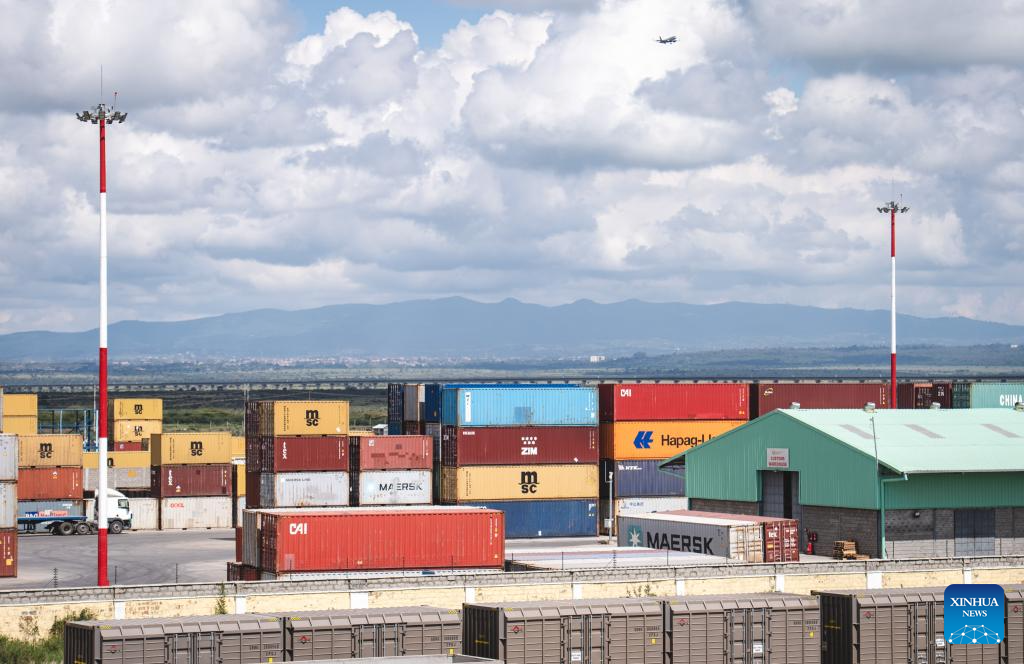
This photo taken on May 23, 2023 shows containers to be transported near the Nairobi Station of the Mombasa-Nairobi Railway in Nairobi, Kenya.
The Mombasa-Nairobi Standard Gauge Railway in Kenya has become a flagship project of China-Africa cooperation, a "business card" of Chinese enterprises and a demonstration project of the Belt and Road Initiative.
The 480-km rail line, linking the largest port in East Africa, Mombasa, to Kenya's capital Nairobi, was built by the China Road and Bridge Corporation and officially opened to traffic in 2017.
The project has gained trust and support from the Kenyan government and people and injected vitality into the country's socio-economic development, since Africa Star Railway Operation Company (AfriStar), the railway operator, has always been committed to ensuring safe operation, boosting the movement of passengers and goods, and enhancing localization of the project.
Chinese experts have been saving no effort in training local staff members and transfer technologies and know-hows to their local counterparts since the railway project started from scratch.
After years of professional training and practice, many Kenyan employees have become skilled workers who can fulfill tasks on their own, and more and more sections of the railway have been independently operated by Kenyan locomotive drivers since February 2022. The mutual diligence also thickened heart-to-heart ties between the Chinese instructors and their Kenyan apprentices.
According to AfriStar, Chinese instructors are going to gradually conclude their missions here and return home, leaving on-premise jobs solely to their Kenyan apprentices, but their friendship would last forever and yield richer fruits in the future. (Xinhua/Wang Guansen)
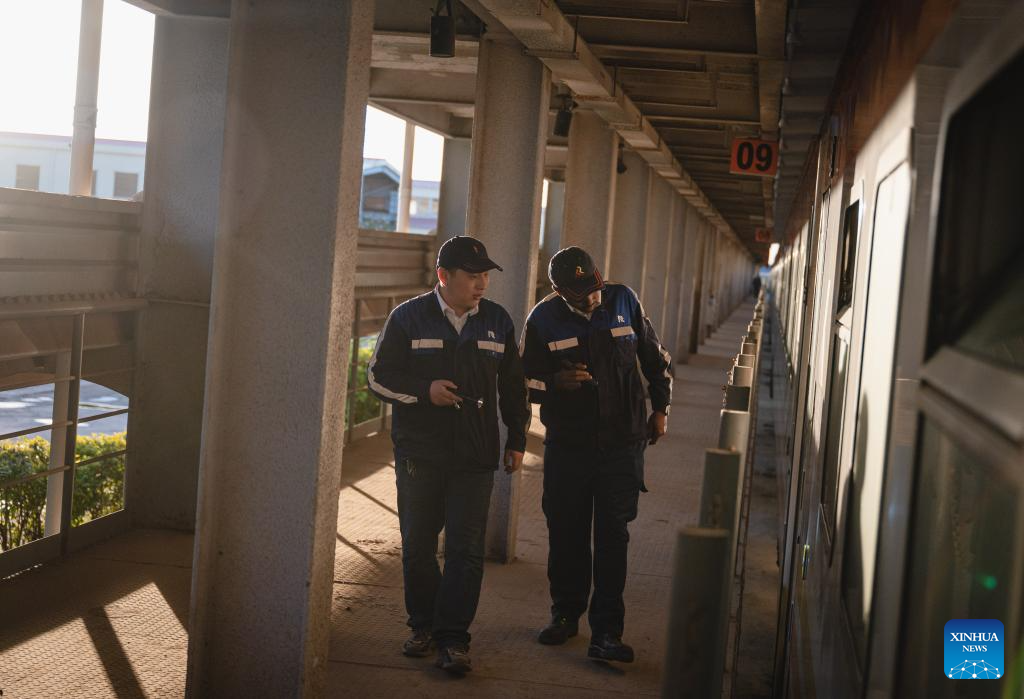
Chinese instructor Wu Tongming (L) and apprentice Boniface Kirumwa inspect a train on Mombasa-Nairobi Railway in Nairobi, Kenya, May 23, 2023. Wu is an engineer of Africa Star Railway Operation Company who has been working in Nairobi since 2017. With the increase of Mombasa-Nairobi Railway's demand for transport capacity, he worked with the apprentices to update the testing rules for the additional night trains. "I was impressed by the apprentices' initiative," Wu said. Boniface Kirumwa believes that learning from Chinese instructors helps him gain technical and practical experience. "I hope more Chinese instructors will come to Kenya in the future and work with us to promote infrastructure development," said Kirumwa.
The Mombasa-Nairobi Standard Gauge Railway in Kenya has become a flagship project of China-Africa cooperation, a "business card" of Chinese enterprises and a demonstration project of the Belt and Road Initiative.
The 480-km rail line, linking the largest port in East Africa, Mombasa, to Kenya's capital Nairobi, was built by the China Road and Bridge Corporation and officially opened to traffic in 2017.
The project has gained trust and support from the Kenyan government and people and injected vitality into the country's socio-economic development, since Africa Star Railway Operation Company (AfriStar), the railway operator, has always been committed to ensuring safe operation, boosting the movement of passengers and goods, and enhancing localization of the project.
Chinese experts have been saving no effort in training local staff members and transfer technologies and know-hows to their local counterparts since the railway project started from scratch.
After years of professional training and practice, many Kenyan employees have become skilled workers who can fulfill tasks on their own, and more and more sections of the railway have been independently operated by Kenyan locomotive drivers since February 2022. The mutual diligence also thickened heart-to-heart ties between the Chinese instructors and their Kenyan apprentices.
According to AfriStar, Chinese instructors are going to gradually conclude their missions here and return home, leaving on-premise jobs solely to their Kenyan apprentices, but their friendship would last forever and yield richer fruits in the future. (Xinhua/Wang Guansen)
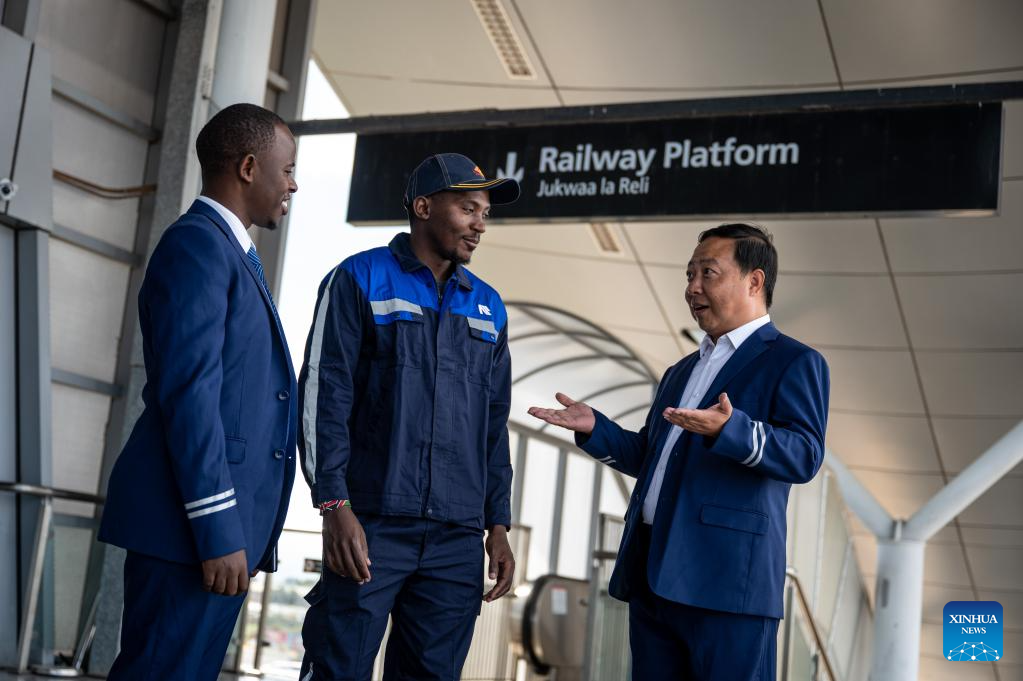
Chinese instructor Mao Xin (R) talks with colleagues at the Nairobi Station of the Mombasa-Nairobi Railway in Nairobi, Kenya, May 23, 2023. Mao works for the transportation department of Africa Star Railway Operation Company. He and his apprentice Peter Njenga have been working together on the dispatching plan to regulate train operation. "We have brought Chinese technical standards to Kenya without reservation, and most apprentices have reached the same operating standards." Mao said that helping Kenya build the first modern railway is a highlight of his career. Peter said that he had learned a lot of professional skills from his instructors, and he would pass on the knowledge to more people in the future.
The Mombasa-Nairobi Standard Gauge Railway in Kenya has become a flagship project of China-Africa cooperation, a "business card" of Chinese enterprises and a demonstration project of the Belt and Road Initiative.
The 480-km rail line, linking the largest port in East Africa, Mombasa, to Kenya's capital Nairobi, was built by the China Road and Bridge Corporation and officially opened to traffic in 2017.
The project has gained trust and support from the Kenyan government and people and injected vitality into the country's socio-economic development, since Africa Star Railway Operation Company (AfriStar), the railway operator, has always been committed to ensuring safe operation, boosting the movement of passengers and goods, and enhancing localization of the project.
Chinese experts have been saving no effort in training local staff members and transfer technologies and know-hows to their local counterparts since the railway project started from scratch.
After years of professional training and practice, many Kenyan employees have become skilled workers who can fulfill tasks on their own, and more and more sections of the railway have been independently operated by Kenyan locomotive drivers since February 2022. The mutual diligence also thickened heart-to-heart ties between the Chinese instructors and their Kenyan apprentices.
According to AfriStar, Chinese instructors are going to gradually conclude their missions here and return home, leaving on-premise jobs solely to their Kenyan apprentices, but their friendship would last forever and yield richer fruits in the future. (Xinhua/Wang Guansen)
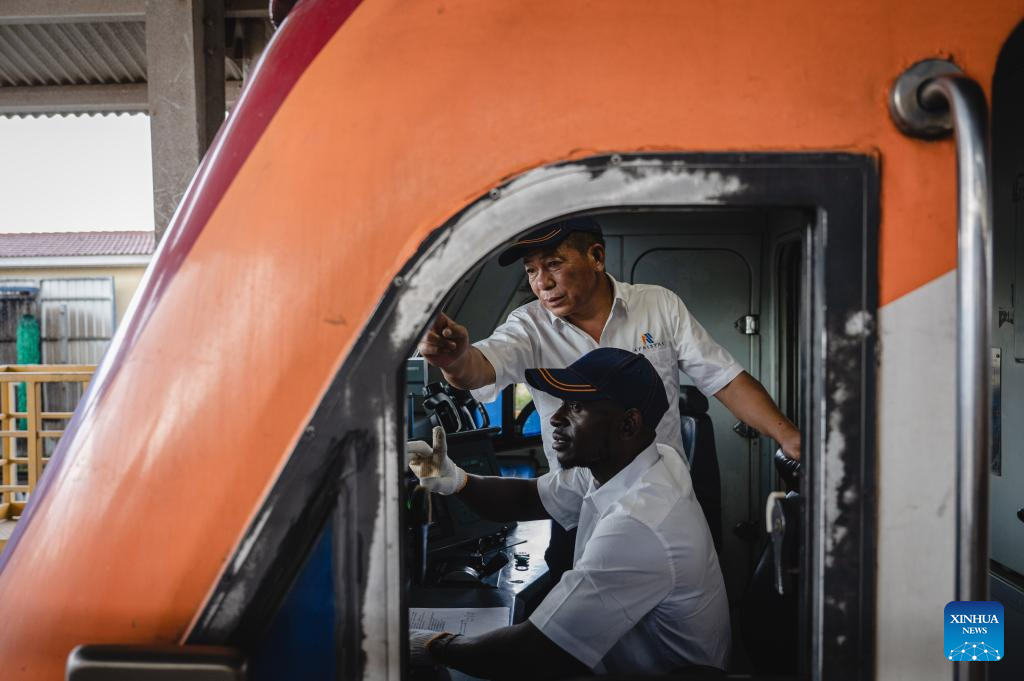
Chinese instructor Jiang Liping (back) works with apprentice Horace Owiti in Nairobi, Kenya, May 23, 2023. Jiang is a train driver of the Africa Star Railway Operation Company. He came to Kenya in 2018 and was responsible for the technical training of drivers and supervision of standardized operation. Horace is Jiang's apprentice, and they work together along the Mombasa-Nairobi railway. "Horace is intelligent and hardworking," Jiang said, "I hope the apprentices will come to visit China as guests, because we are not only colleagues but also friends." Horace said that he has benefited a lot from the professional training of the Chinese instructors. "I hope they can come back to Kenya often," he said. In the future, he plans to train more reliable drivers for the Mombasa-Nairobi railway.
The Mombasa-Nairobi Standard Gauge Railway in Kenya has become a flagship project of China-Africa cooperation, a "business card" of Chinese enterprises and a demonstration project of the Belt and Road Initiative.
The 480-km rail line, linking the largest port in East Africa, Mombasa, to Kenya's capital Nairobi, was built by the China Road and Bridge Corporation and officially opened to traffic in 2017.
The project has gained trust and support from the Kenyan government and people and injected vitality into the country's socio-economic development, since Africa Star Railway Operation Company (AfriStar), the railway operator, has always been committed to ensuring safe operation, boosting the movement of passengers and goods, and enhancing localization of the project.
Chinese experts have been saving no effort in training local staff members and transfer technologies and know-hows to their local counterparts since the railway project started from scratch.
After years of professional training and practice, many Kenyan employees have become skilled workers who can fulfill tasks on their own, and more and more sections of the railway have been independently operated by Kenyan locomotive drivers since February 2022. The mutual diligence also thickened heart-to-heart ties between the Chinese instructors and their Kenyan apprentices.
According to AfriStar, Chinese instructors are going to gradually conclude their missions here and return home, leaving on-premise jobs solely to their Kenyan apprentices, but their friendship would last forever and yield richer fruits in the future. (Xinhua/Wang Guansen)
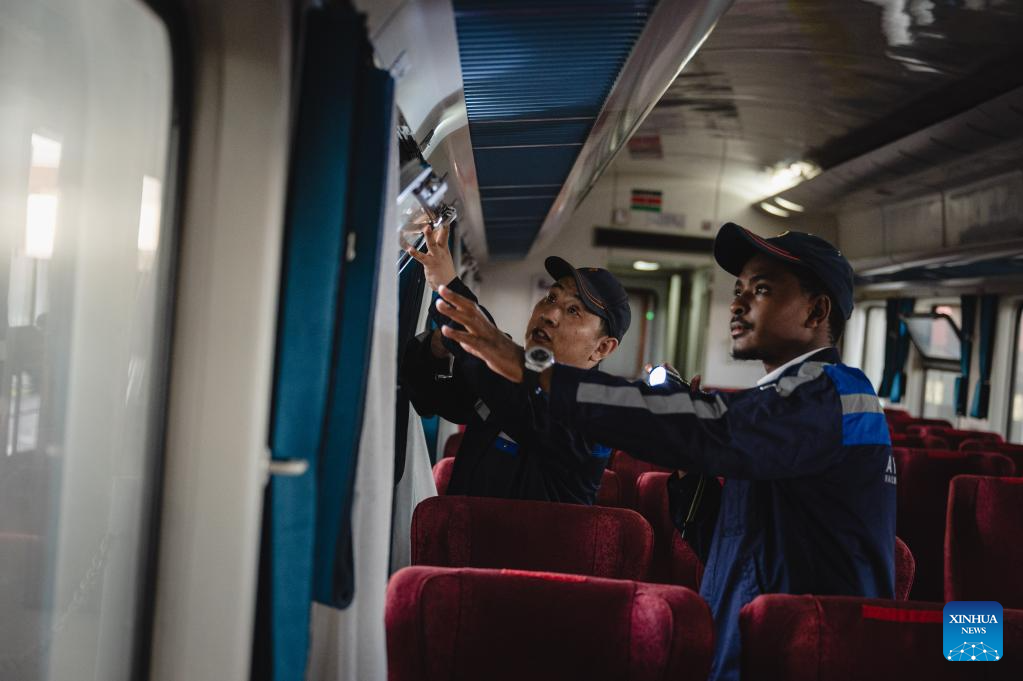
Chinese instructor Wu Tongming (R) and apprentice Boniface Kirumwa inspect a train on Mombasa-Nairobi Railway in Nairobi, Kenya, May 23, 2023. Wu is an engineer of Africa Star Railway Operation Company who has been working in Nairobi since 2017. With the increase of Mombasa-Nairobi Railway's demand for transport capacity, he worked with the apprentices to update the testing rules for the additional night trains. "I was impressed by the apprentices' initiative," Wu said. Boniface Kirumwa believes that learning from Chinese instructors helps him gain technical and practical experience. "I hope more Chinese instructors will come to Kenya in the future and work with us to promote infrastructure development," said Kirumwa.
The Mombasa-Nairobi Standard Gauge Railway in Kenya has become a flagship project of China-Africa cooperation, a "business card" of Chinese enterprises and a demonstration project of the Belt and Road Initiative.
The 480-km rail line, linking the largest port in East Africa, Mombasa, to Kenya's capital Nairobi, was built by the China Road and Bridge Corporation and officially opened to traffic in 2017.
The project has gained trust and support from the Kenyan government and people and injected vitality into the country's socio-economic development, since Africa Star Railway Operation Company (AfriStar), the railway operator, has always been committed to ensuring safe operation, boosting the movement of passengers and goods, and enhancing localization of the project.
Chinese experts have been saving no effort in training local staff members and transfer technologies and know-hows to their local counterparts since the railway project started from scratch.
After years of professional training and practice, many Kenyan employees have become skilled workers who can fulfill tasks on their own, and more and more sections of the railway have been independently operated by Kenyan locomotive drivers since February 2022. The mutual diligence also thickened heart-to-heart ties between the Chinese instructors and their Kenyan apprentices.
According to AfriStar, Chinese instructors are going to gradually conclude their missions here and return home, leaving on-premise jobs solely to their Kenyan apprentices, but their friendship would last forever and yield richer fruits in the future. (Xinhua/Wang Guansen)
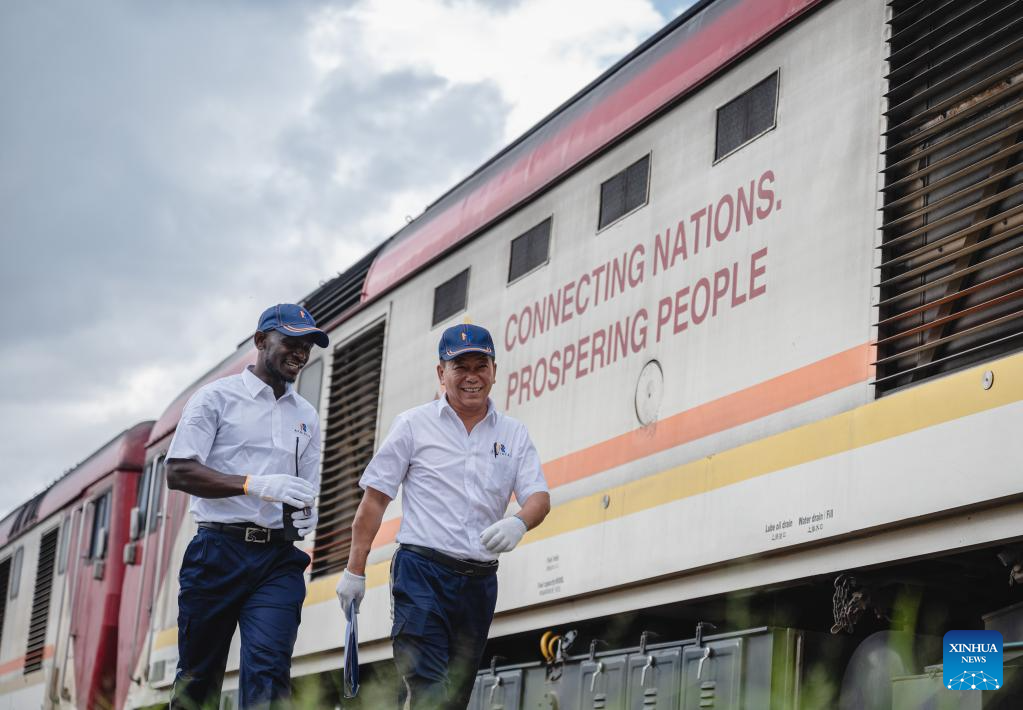
Chinese instructor Jiang Liping (R) and apprentice Horace Owiti walk past a train carriage on the Mombasa-Nairobi Railway with a printed slogan reading "connecting nations, prospering people" in Nairobi, Kenya, May 23, 2023. Jiang is a train driver of the Africa Star Railway Operation Company. He came to Kenya in 2018 and was responsible for the technical training of drivers and supervision of standardized operation. Horace is Jiang's apprentice, and they work together along the Mombasa-Nairobi railway. "Horace is intelligent and hardworking," Jiang said, "I hope the apprentices will come to visit China as guests, because we are not only colleagues but also friends." Horace said that he has benefited a lot from the professional training of the Chinese instructors. "I hope they can come back to Kenya often," he said. In the future, he plans to train more reliable drivers for the Mombasa-Nairobi railway.
The Mombasa-Nairobi Standard Gauge Railway in Kenya has become a flagship project of China-Africa cooperation, a "business card" of Chinese enterprises and a demonstration project of the Belt and Road Initiative.
The 480-km rail line, linking the largest port in East Africa, Mombasa, to Kenya's capital Nairobi, was built by the China Road and Bridge Corporation and officially opened to traffic in 2017.
The project has gained trust and support from the Kenyan government and people and injected vitality into the country's socio-economic development, since Africa Star Railway Operation Company (AfriStar), the railway operator, has always been committed to ensuring safe operation, boosting the movement of passengers and goods, and enhancing localization of the project.
Chinese experts have been saving no effort in training local staff members and transfer technologies and know-hows to their local counterparts since the railway project started from scratch.
After years of professional training and practice, many Kenyan employees have become skilled workers who can fulfill tasks on their own, and more and more sections of the railway have been independently operated by Kenyan locomotive drivers since February 2022. The mutual diligence also thickened heart-to-heart ties between the Chinese instructors and their Kenyan apprentices.
According to AfriStar, Chinese instructors are going to gradually conclude their missions here and return home, leaving on-premise jobs solely to their Kenyan apprentices, but their friendship would last forever and yield richer fruits in the future. (Xinhua/Wang Guansen)
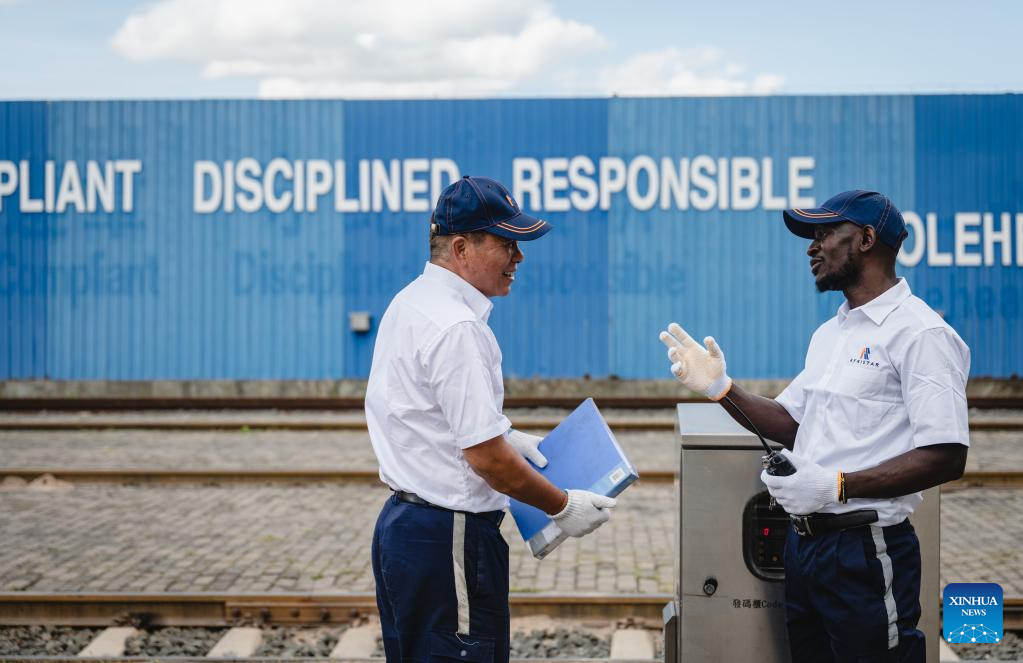
Chinese instructor Jiang Liping (L) talks with apprentice Horace Owiti in Nairobi, Kenya, May 23, 2023. Jiang is a train driver of the Africa Star Railway Operation Company. He came to Kenya in 2018 and was responsible for the technical training of drivers and supervision of standardized operation. Horace is Jiang's apprentice, and they work together along the Mombasa-Nairobi railway. "Horace is intelligent and hardworking," Jiang said, "I hope the apprentices will come to visit China as guests, because we are not only colleagues but also friends." Horace said that he has benefited a lot from the professional training of the Chinese instructors. "I hope they can come back to Kenya often," he said. In the future, he plans to train more reliable drivers for the Mombasa-Nairobi railway.
The Mombasa-Nairobi Standard Gauge Railway in Kenya has become a flagship project of China-Africa cooperation, a "business card" of Chinese enterprises and a demonstration project of the Belt and Road Initiative.
The 480-km rail line, linking the largest port in East Africa, Mombasa, to Kenya's capital Nairobi, was built by the China Road and Bridge Corporation and officially opened to traffic in 2017.
The project has gained trust and support from the Kenyan government and people and injected vitality into the country's socio-economic development, since Africa Star Railway Operation Company (AfriStar), the railway operator, has always been committed to ensuring safe operation, boosting the movement of passengers and goods, and enhancing localization of the project.
Chinese experts have been saving no effort in training local staff members and transfer technologies and know-hows to their local counterparts since the railway project started from scratch.
After years of professional training and practice, many Kenyan employees have become skilled workers who can fulfill tasks on their own, and more and more sections of the railway have been independently operated by Kenyan locomotive drivers since February 2022. The mutual diligence also thickened heart-to-heart ties between the Chinese instructors and their Kenyan apprentices.
According to AfriStar, Chinese instructors are going to gradually conclude their missions here and return home, leaving on-premise jobs solely to their Kenyan apprentices, but their friendship would last forever and yield richer fruits in the future. (Xinhua/Wang Guansen)
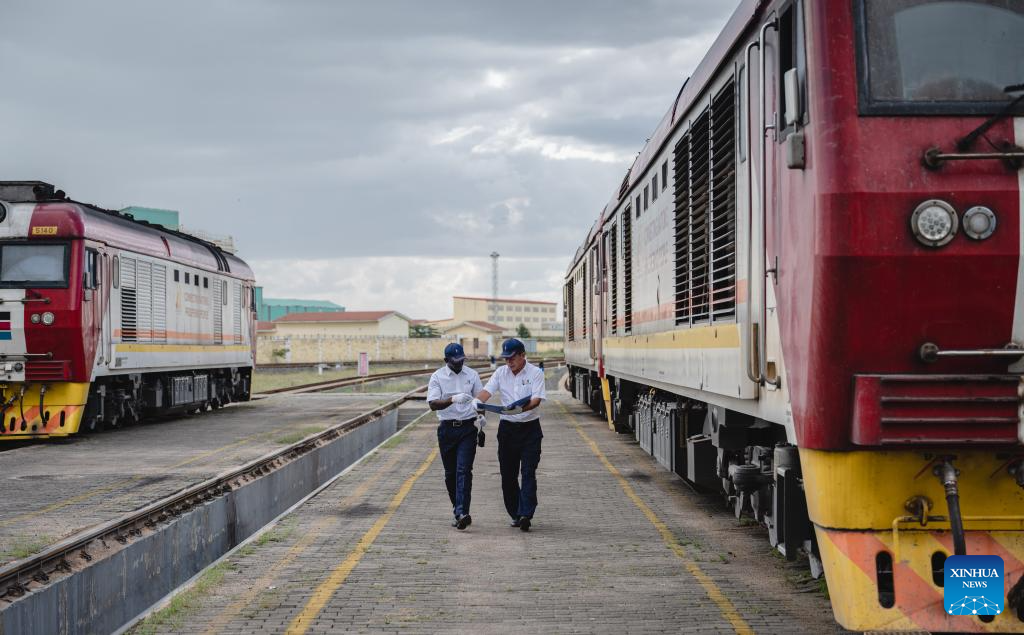
Chinese instructor Jiang Liping (R) and apprentice Horace Owiti carry out locomotive inspection in Nairobi, Kenya, May 23, 2023. Jiang is a train driver of the Africa Star Railway Operation Company. He came to Kenya in 2018 and was responsible for the technical training of drivers and supervision of standardized operation. Horace is Jiang's apprentice, and they work together along the Mombasa-Nairobi railway. "Horace is intelligent and hardworking," Jiang said, "I hope the apprentices will come to visit China as guests, because we are not only colleagues but also friends." Horace said that he has benefited a lot from the professional training of the Chinese instructors. "I hope they can come back to Kenya often," he said. In the future, he plans to train more reliable drivers for the Mombasa-Nairobi railway.
The Mombasa-Nairobi Standard Gauge Railway in Kenya has become a flagship project of China-Africa cooperation, a "business card" of Chinese enterprises and a demonstration project of the Belt and Road Initiative.
The 480-km rail line, linking the largest port in East Africa, Mombasa, to Kenya's capital Nairobi, was built by the China Road and Bridge Corporation and officially opened to traffic in 2017.
The project has gained trust and support from the Kenyan government and people and injected vitality into the country's socio-economic development, since Africa Star Railway Operation Company (AfriStar), the railway operator, has always been committed to ensuring safe operation, boosting the movement of passengers and goods, and enhancing localization of the project.
Chinese experts have been saving no effort in training local staff members and transfer technologies and know-hows to their local counterparts since the railway project started from scratch.
After years of professional training and practice, many Kenyan employees have become skilled workers who can fulfill tasks on their own, and more and more sections of the railway have been independently operated by Kenyan locomotive drivers since February 2022. The mutual diligence also thickened heart-to-heart ties between the Chinese instructors and their Kenyan apprentices.
According to AfriStar, Chinese instructors are going to gradually conclude their missions here and return home, leaving on-premise jobs solely to their Kenyan apprentices, but their friendship would last forever and yield richer fruits in the future. (Xinhua/Wang Guansen)
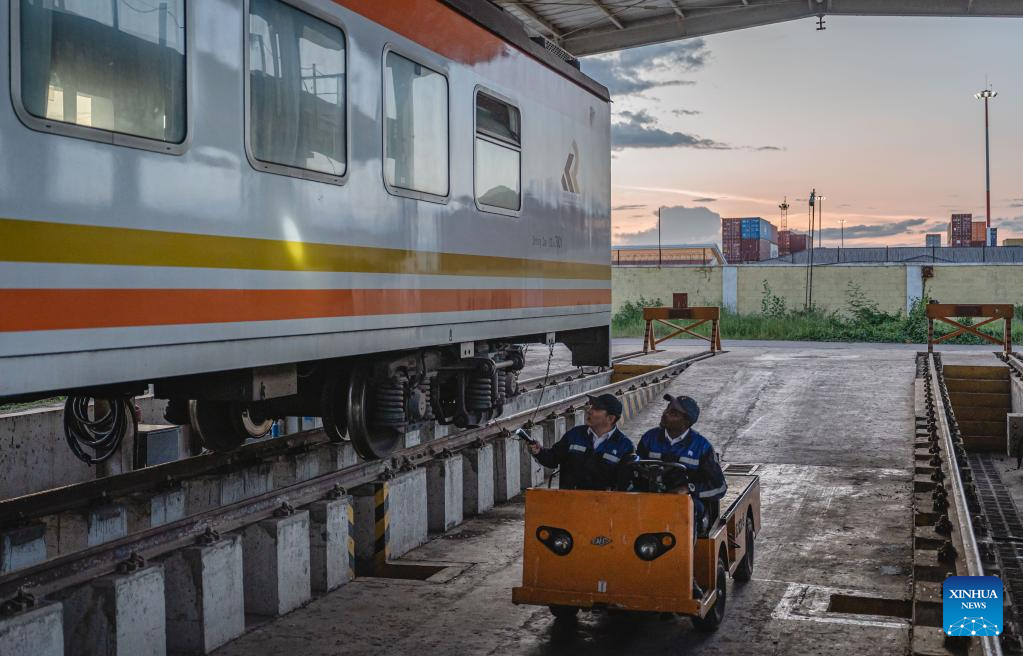
Chinese instructor Wu Tongming (L) and apprentice Boniface Kirumwa inspect a train on Mombasa-Nairobi Railway in Nairobi, Kenya, May 23, 2023. Wu is an engineer of Africa Star Railway Operation Company who has been working in Nairobi since 2017. With the increase of Mombasa-Nairobi Railway's demand for transport capacity, he worked with the apprentices to update the testing rules for the additional night trains. "I was impressed by the apprentices' initiative," Wu said. Boniface Kirumwa believes that learning from Chinese instructors helps him gain technical and practical experience. "I hope more Chinese instructors will come to Kenya in the future and work with us to promote infrastructure development," said Kirumwa.
The Mombasa-Nairobi Standard Gauge Railway in Kenya has become a flagship project of China-Africa cooperation, a "business card" of Chinese enterprises and a demonstration project of the Belt and Road Initiative.
The 480-km rail line, linking the largest port in East Africa, Mombasa, to Kenya's capital Nairobi, was built by the China Road and Bridge Corporation and officially opened to traffic in 2017.
The project has gained trust and support from the Kenyan government and people and injected vitality into the country's socio-economic development, since Africa Star Railway Operation Company (AfriStar), the railway operator, has always been committed to ensuring safe operation, boosting the movement of passengers and goods, and enhancing localization of the project.
Chinese experts have been saving no effort in training local staff members and transfer technologies and know-hows to their local counterparts since the railway project started from scratch.
After years of professional training and practice, many Kenyan employees have become skilled workers who can fulfill tasks on their own, and more and more sections of the railway have been independently operated by Kenyan locomotive drivers since February 2022. The mutual diligence also thickened heart-to-heart ties between the Chinese instructors and their Kenyan apprentices.
According to AfriStar, Chinese instructors are going to gradually conclude their missions here and return home, leaving on-premise jobs solely to their Kenyan apprentices, but their friendship would last forever and yield richer fruits in the future. (Xinhua/Wang Guansen)
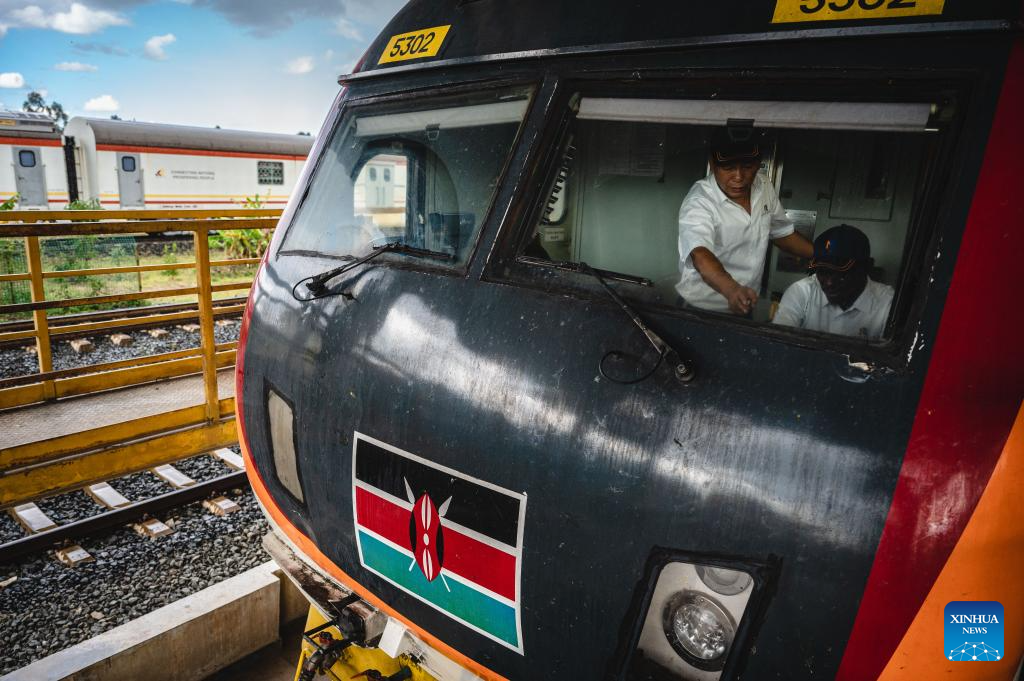
Chinese instructor Jiang Liping (L) and apprentice Horace Owiti carry out locomotive inspection in Nairobi, Kenya, May 23, 2023. Jiang is a train driver of the Africa Star Railway Operation Company. He came to Kenya in 2018 and was responsible for the technical training of drivers and supervision of standardized operation. Horace is Jiang's apprentice, and they work together along the Mombasa-Nairobi railway. "Horace is intelligent and hardworking," Jiang said, "I hope the apprentices will come to visit China as guests, because we are not only colleagues but also friends." Horace said that he has benefited a lot from the professional training of the Chinese instructors. "I hope they can come back to Kenya often," he said. In the future, he plans to train more reliable drivers for the Mombasa-Nairobi railway.
The Mombasa-Nairobi Standard Gauge Railway in Kenya has become a flagship project of China-Africa cooperation, a "business card" of Chinese enterprises and a demonstration project of the Belt and Road Initiative.
The 480-km rail line, linking the largest port in East Africa, Mombasa, to Kenya's capital Nairobi, was built by the China Road and Bridge Corporation and officially opened to traffic in 2017.
The project has gained trust and support from the Kenyan government and people and injected vitality into the country's socio-economic development, since Africa Star Railway Operation Company (AfriStar), the railway operator, has always been committed to ensuring safe operation, boosting the movement of passengers and goods, and enhancing localization of the project.
Chinese experts have been saving no effort in training local staff members and transfer technologies and know-hows to their local counterparts since the railway project started from scratch.
After years of professional training and practice, many Kenyan employees have become skilled workers who can fulfill tasks on their own, and more and more sections of the railway have been independently operated by Kenyan locomotive drivers since February 2022. The mutual diligence also thickened heart-to-heart ties between the Chinese instructors and their Kenyan apprentices.
According to AfriStar, Chinese instructors are going to gradually conclude their missions here and return home, leaving on-premise jobs solely to their Kenyan apprentices, but their friendship would last forever and yield richer fruits in the future. (Xinhua/Wang Guansen)
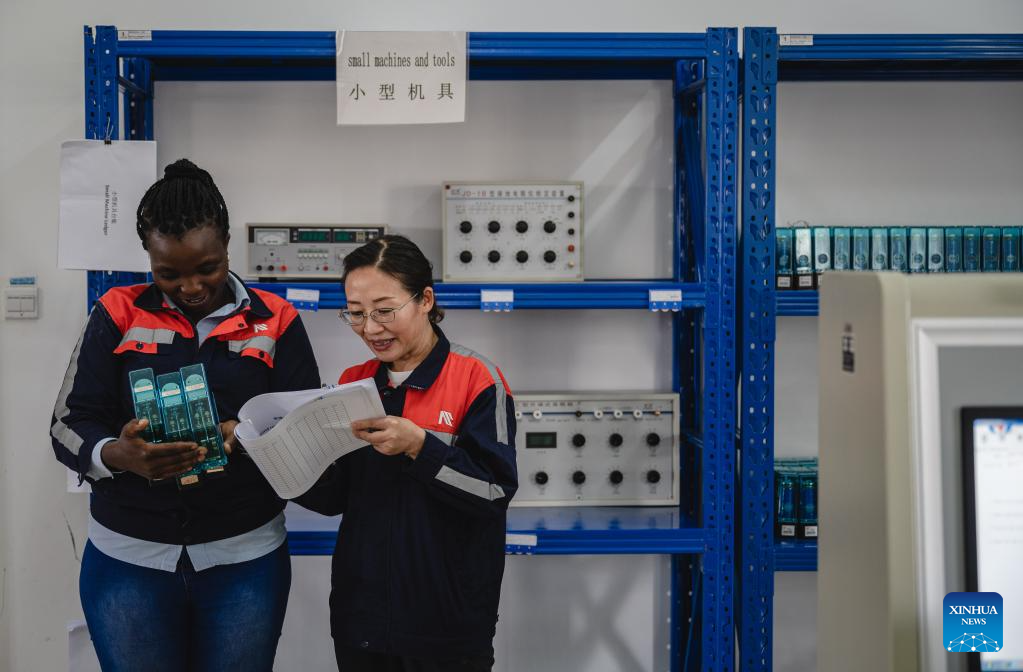
Chinese instructor Chen Ling (R) works with apprentice Lucy Njeri Wanjohi in Nairobi, Kenya, May 23, 2023. Chen works for the electrical equipment maintenance section of the Africa Star Railway Operation Company. In the four years she has been working in Kenya, she witnessed the improvement on vocational skills of her female apprentices. "Now they can all work on their own," Chen said. Judith Wanzila Peter, one of Chen's apprentices, said she learned more than just skills from her instructor. She also learned a lot from their intercultural exchanges. "We are more like friends and sisters," Judith said.
The Mombasa-Nairobi Standard Gauge Railway in Kenya has become a flagship project of China-Africa cooperation, a "business card" of Chinese enterprises and a demonstration project of the Belt and Road Initiative.
The 480-km rail line, linking the largest port in East Africa, Mombasa, to Kenya's capital Nairobi, was built by the China Road and Bridge Corporation and officially opened to traffic in 2017.
The project has gained trust and support from the Kenyan government and people and injected vitality into the country's socio-economic development, since Africa Star Railway Operation Company (AfriStar), the railway operator, has always been committed to ensuring safe operation, boosting the movement of passengers and goods, and enhancing localization of the project.
Chinese experts have been saving no effort in training local staff members and transfer technologies and know-hows to their local counterparts since the railway project started from scratch.
After years of professional training and practice, many Kenyan employees have become skilled workers who can fulfill tasks on their own, and more and more sections of the railway have been independently operated by Kenyan locomotive drivers since February 2022. The mutual diligence also thickened heart-to-heart ties between the Chinese instructors and their Kenyan apprentices.
According to AfriStar, Chinese instructors are going to gradually conclude their missions here and return home, leaving on-premise jobs solely to their Kenyan apprentices, but their friendship would last forever and yield richer fruits in the future. (Xinhua/Wang Guansen)
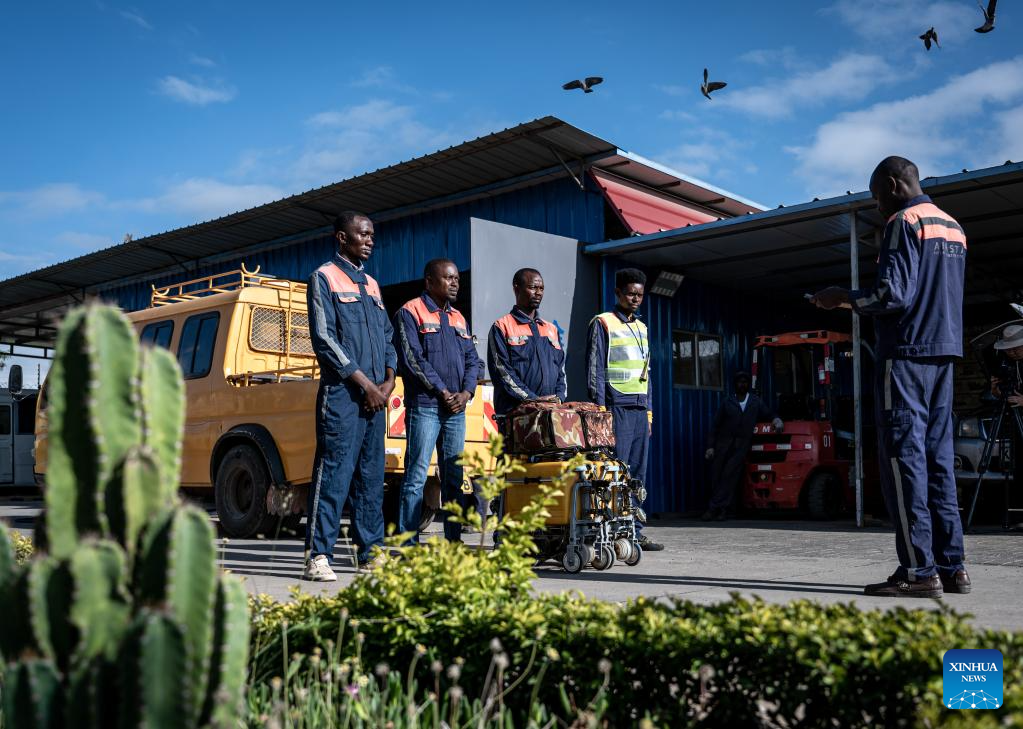
Railway workers listen to rules on operation before their shift in Nairobi, Kenya, May 23, 2023.
The Mombasa-Nairobi Standard Gauge Railway in Kenya has become a flagship project of China-Africa cooperation, a "business card" of Chinese enterprises and a demonstration project of the Belt and Road Initiative.
The 480-km rail line, linking the largest port in East Africa, Mombasa, to Kenya's capital Nairobi, was built by the China Road and Bridge Corporation and officially opened to traffic in 2017.
The project has gained trust and support from the Kenyan government and people and injected vitality into the country's socio-economic development, since Africa Star Railway Operation Company (AfriStar), the railway operator, has always been committed to ensuring safe operation, boosting the movement of passengers and goods, and enhancing localization of the project.
Chinese experts have been saving no effort in training local staff members and transfer technologies and know-hows to their local counterparts since the railway project started from scratch.
After years of professional training and practice, many Kenyan employees have become skilled workers who can fulfill tasks on their own, and more and more sections of the railway have been independently operated by Kenyan locomotive drivers since February 2022. The mutual diligence also thickened heart-to-heart ties between the Chinese instructors and their Kenyan apprentices.
According to AfriStar, Chinese instructors are going to gradually conclude their missions here and return home, leaving on-premise jobs solely to their Kenyan apprentices, but their friendship would last forever and yield richer fruits in the future. (Xinhua/Wang Guansen)
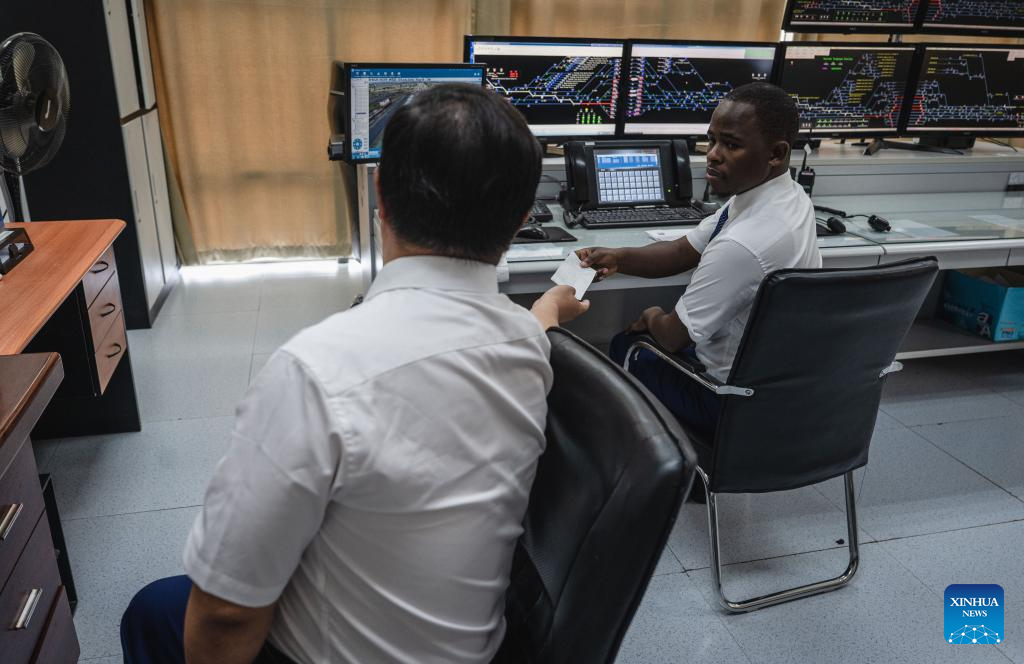
Chinese instructor Mao Xin (L) works with apprentice Peter Njenga at the Nairobi Station of the Mombasa-Nairobi Railway in Nairobi, Kenya, May 23, 2023. Mao works for the transportation department of Africa Star Railway Operation Company. He and his apprentice Peter Njenga have been working together on the dispatching plan to regulate train operation. "We have brought Chinese technical standards to Kenya without reservation, and most apprentices have reached the same operating standards." Mao said that helping Kenya build the first modern railway is a highlight of his career. Peter said that he had learned a lot of professional skills from his instructors, and he would pass on the knowledge to more people in the future.
The Mombasa-Nairobi Standard Gauge Railway in Kenya has become a flagship project of China-Africa cooperation, a "business card" of Chinese enterprises and a demonstration project of the Belt and Road Initiative.
The 480-km rail line, linking the largest port in East Africa, Mombasa, to Kenya's capital Nairobi, was built by the China Road and Bridge Corporation and officially opened to traffic in 2017.
The project has gained trust and support from the Kenyan government and people and injected vitality into the country's socio-economic development, since Africa Star Railway Operation Company (AfriStar), the railway operator, has always been committed to ensuring safe operation, boosting the movement of passengers and goods, and enhancing localization of the project.
Chinese experts have been saving no effort in training local staff members and transfer technologies and know-hows to their local counterparts since the railway project started from scratch.
After years of professional training and practice, many Kenyan employees have become skilled workers who can fulfill tasks on their own, and more and more sections of the railway have been independently operated by Kenyan locomotive drivers since February 2022. The mutual diligence also thickened heart-to-heart ties between the Chinese instructors and their Kenyan apprentices.
According to AfriStar, Chinese instructors are going to gradually conclude their missions here and return home, leaving on-premise jobs solely to their Kenyan apprentices, but their friendship would last forever and yield richer fruits in the future. (Xinhua/Wang Guansen)
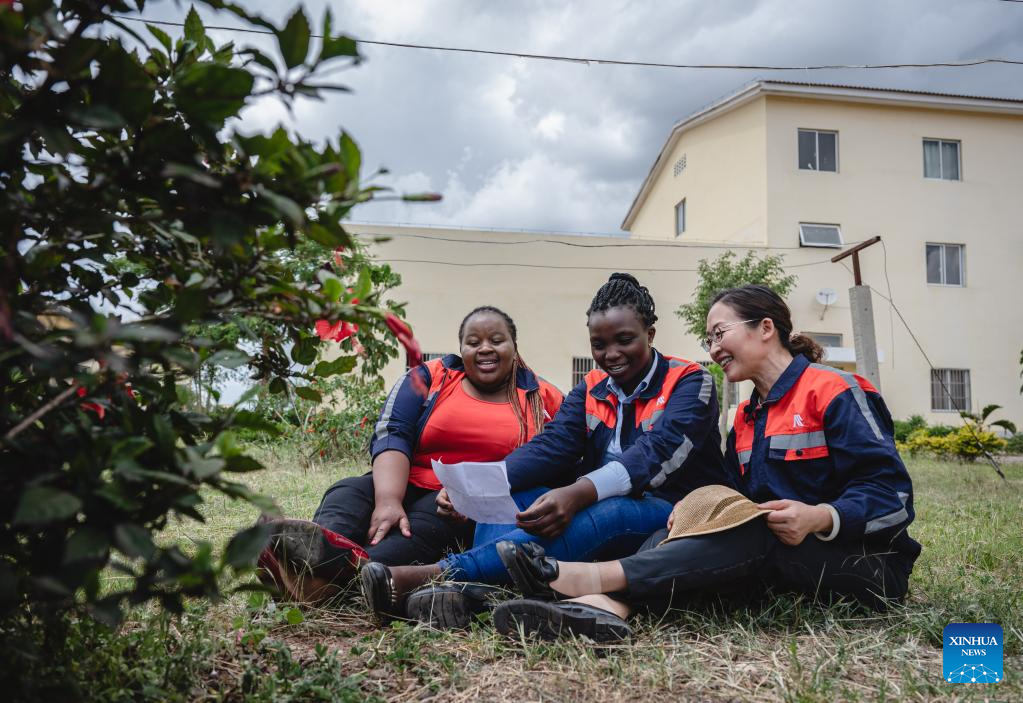
Chinese instructor Chen Ling (R) teaches her apprentices to sing Chinese songs during work break in Nairobi, Kenya, May 23, 2023. Chen works for the electrical equipment maintenance section of the Africa Star Railway Operation Company. In the four years she has been working in Kenya, she witnessed the improvement on vocational skills of her female apprentices. "Now they can all work on their own," Chen said. Judith Wanzila Peter, one of Chen's apprentices, said she learned more than just skills from her instructor. She also learned a lot from their intercultural exchanges. "We are more like friends and sisters," Judith said.
The Mombasa-Nairobi Standard Gauge Railway in Kenya has become a flagship project of China-Africa cooperation, a "business card" of Chinese enterprises and a demonstration project of the Belt and Road Initiative.
The 480-km rail line, linking the largest port in East Africa, Mombasa, to Kenya's capital Nairobi, was built by the China Road and Bridge Corporation and officially opened to traffic in 2017.
The project has gained trust and support from the Kenyan government and people and injected vitality into the country's socio-economic development, since Africa Star Railway Operation Company (AfriStar), the railway operator, has always been committed to ensuring safe operation, boosting the movement of passengers and goods, and enhancing localization of the project.
Chinese experts have been saving no effort in training local staff members and transfer technologies and know-hows to their local counterparts since the railway project started from scratch.
After years of professional training and practice, many Kenyan employees have become skilled workers who can fulfill tasks on their own, and more and more sections of the railway have been independently operated by Kenyan locomotive drivers since February 2022. The mutual diligence also thickened heart-to-heart ties between the Chinese instructors and their Kenyan apprentices.
According to AfriStar, Chinese instructors are going to gradually conclude their missions here and return home, leaving on-premise jobs solely to their Kenyan apprentices, but their friendship would last forever and yield richer fruits in the future. (Xinhua/Wang Guansen)
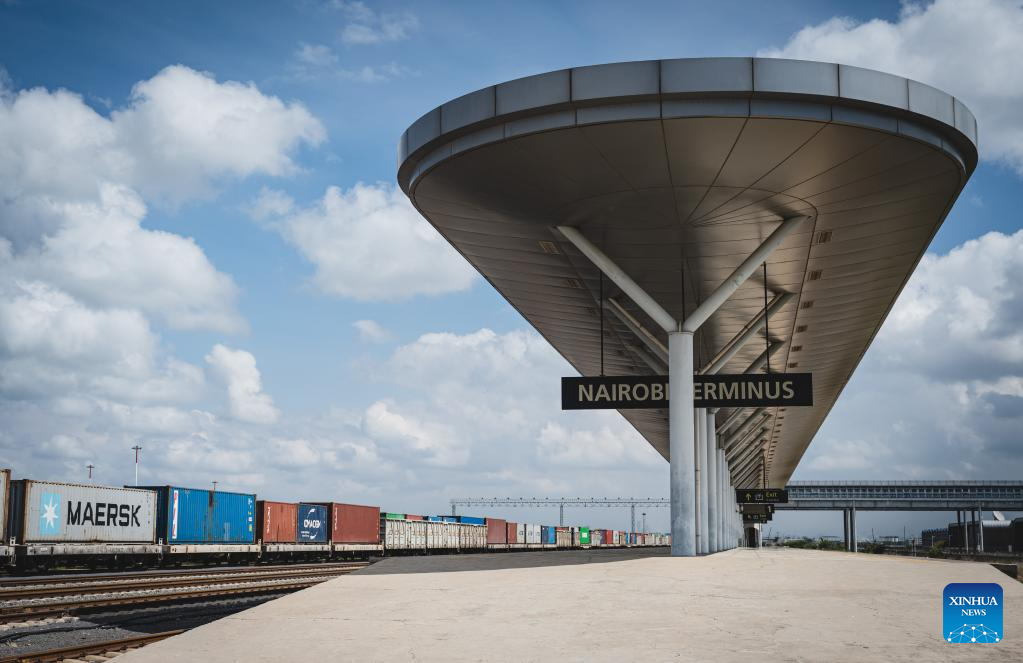
This photo taken on May 23, 2023 shows a platform of the Mombasa-Nairobi Railway in Nairobi, Kenya.
The Mombasa-Nairobi Standard Gauge Railway in Kenya has become a flagship project of China-Africa cooperation, a "business card" of Chinese enterprises and a demonstration project of the Belt and Road Initiative.
The 480-km rail line, linking the largest port in East Africa, Mombasa, to Kenya's capital Nairobi, was built by the China Road and Bridge Corporation and officially opened to traffic in 2017.
The project has gained trust and support from the Kenyan government and people and injected vitality into the country's socio-economic development, since Africa Star Railway Operation Company (AfriStar), the railway operator, has always been committed to ensuring safe operation, boosting the movement of passengers and goods, and enhancing localization of the project.
Chinese experts have been saving no effort in training local staff members and transfer technologies and know-hows to their local counterparts since the railway project started from scratch.
After years of professional training and practice, many Kenyan employees have become skilled workers who can fulfill tasks on their own, and more and more sections of the railway have been independently operated by Kenyan locomotive drivers since February 2022. The mutual diligence also thickened heart-to-heart ties between the Chinese instructors and their Kenyan apprentices.
According to AfriStar, Chinese instructors are going to gradually conclude their missions here and return home, leaving on-premise jobs solely to their Kenyan apprentices, but their friendship would last forever and yield richer fruits in the future. (Xinhua/Wang Guansen)
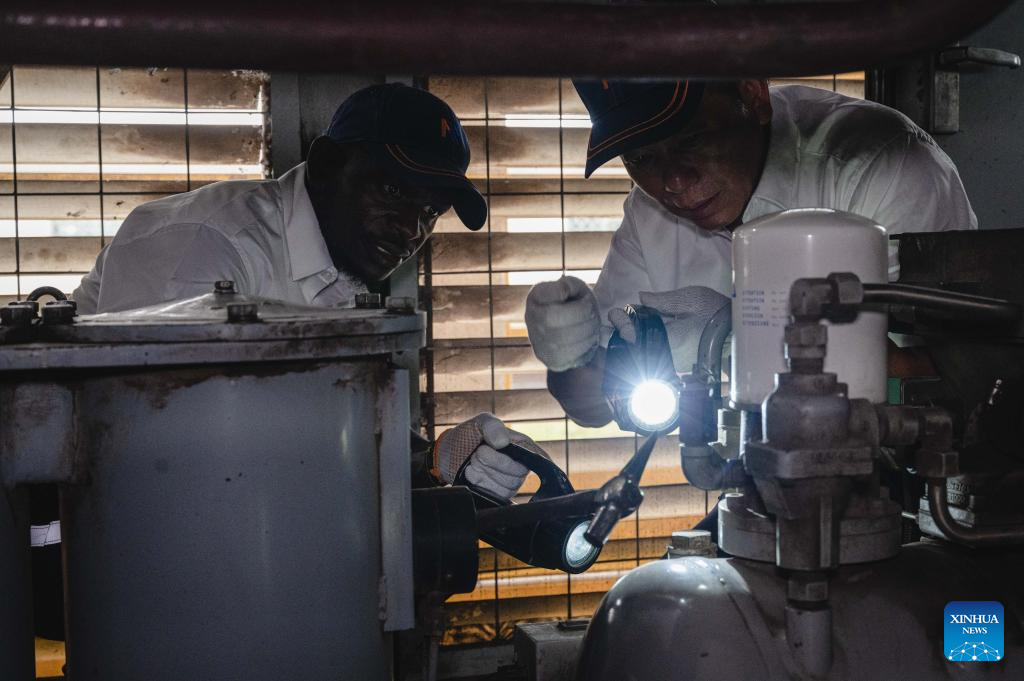
Chinese instructor Jiang Liping (R) and apprentice Horace Owiti carry out locomotive inspection in Nairobi, Kenya, May 23, 2023. Jiang is a train driver of the Africa Star Railway Operation Company. He came to Kenya in 2018 and was responsible for the technical training of drivers and supervision of standardized operation. Horace is Jiang's apprentice, and they work together along the Mombasa-Nairobi railway. "Horace is intelligent and hardworking," Jiang said, "I hope the apprentices will come to visit China as guests, because we are not only colleagues but also friends." Horace said that he has benefited a lot from the professional training of the Chinese instructors. "I hope they can come back to Kenya often," he said. In the future, he plans to train more reliable drivers for the Mombasa-Nairobi railway.
The Mombasa-Nairobi Standard Gauge Railway in Kenya has become a flagship project of China-Africa cooperation, a "business card" of Chinese enterprises and a demonstration project of the Belt and Road Initiative.
The 480-km rail line, linking the largest port in East Africa, Mombasa, to Kenya's capital Nairobi, was built by the China Road and Bridge Corporation and officially opened to traffic in 2017.
The project has gained trust and support from the Kenyan government and people and injected vitality into the country's socio-economic development, since Africa Star Railway Operation Company (AfriStar), the railway operator, has always been committed to ensuring safe operation, boosting the movement of passengers and goods, and enhancing localization of the project.
Chinese experts have been saving no effort in training local staff members and transfer technologies and know-hows to their local counterparts since the railway project started from scratch.
After years of professional training and practice, many Kenyan employees have become skilled workers who can fulfill tasks on their own, and more and more sections of the railway have been independently operated by Kenyan locomotive drivers since February 2022. The mutual diligence also thickened heart-to-heart ties between the Chinese instructors and their Kenyan apprentices.
According to AfriStar, Chinese instructors are going to gradually conclude their missions here and return home, leaving on-premise jobs solely to their Kenyan apprentices, but their friendship would last forever and yield richer fruits in the future. (Xinhua/Wang Guansen)

